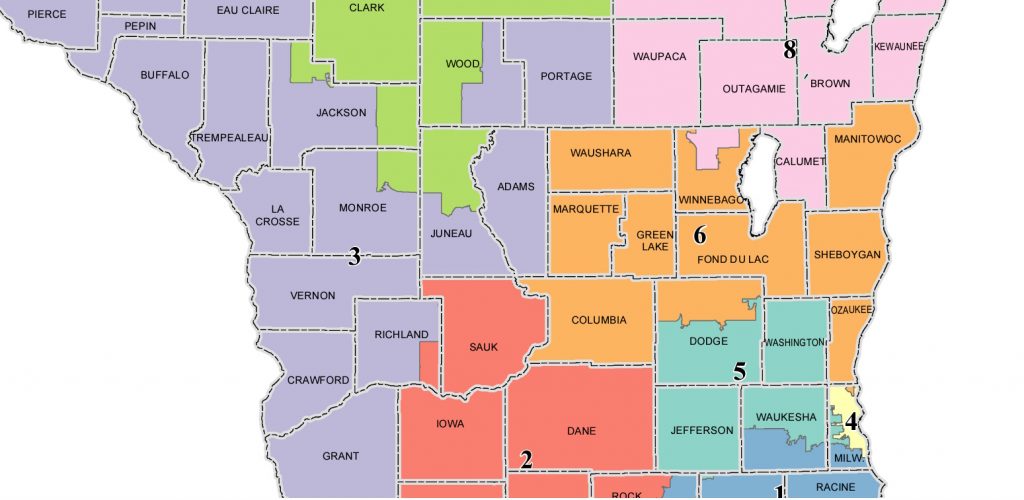Who Are These Guys?
Who filed second gerrymandering lawsuit and why? Nine questions the case raises.
All eyes were on the lawsuit challenging Wisconsin’s gerrymandered legislative seats when, lo and behold, a separate lawsuit was filed this week charging that the state’s congressional districts are also gerrymandered and must be fixed. To which some readers probably said “huh?” Why a separate suit, why now, and as Butch Cassidy and Sundance Kid might say, “who are these guys” (and many ladies, actually) behind the suit? Never fear, we here at Urban Milwaukee are ready to answer all your questions.
1. Why didn’t the first lawsuit challenge the congressional districts? Clearly this was strategic by Law Forward, the Madison-based Democratic firm which filed the suit. A lawsuit challenging only the state’s legislative districts makes it a state matter under the Wisconsin Constitution’s requirement that all districts must be contiguous. Meaning an appeal to the U.S. Supreme Court (which Republican Assembly Speaker Robin Vos has huffed and puffed and warned about) would be difficult because the ultimate interpreter of a state’s laws and constitution is its state Supreme Court.
2. So who has filed the second suit challenging congressional districts? The lead firm is the Washington D.C.-based Elias Law Group, which has 16 shiny-faced partners and describes itself as “a mission-driven firm committed to helping Democrats win, citizens vote, and progressives make change.” Marc Elias, the firm’s leader, might be the Republicans’ worst nightmare: he has a ton of experience handling cases involving politics, voting rights, and redistricting, including helping win 60 cases defending the 2020 election from challenges by Donald Trump and his allies. The firm is also working with the Democratic-leaning Pines Bach firm based in Madison.
3. Are the congressional districts as badly gerrymandered as the legislative districts? In a word, yes. In a purple, evenly-divided state like Wisconsin, you’d expect a 4-4 split of the 8 congressional districts or maybe a 5-3 split, but 6 of 8 districts are represented by Republicans. The GOP made this happen by packing a ton of Democrats in the Milwaukee-based 4th District of Gwen Moore, which is 75% Democratic and the Madison-based 2nd District of Mark Pocan, which is 71% Democratic. That allowed the GOP to create five other districts that are 55% to 64% Republican and one district that leans slightly Republican.
The lawsuit quotes Dr. Jonathan Rodden, an expert the firm hired who seems to have all bases covered: He’s a Professor of Political Science at Stanford University, founder and director of the Stanford Spatial Social Science Lab and a senior fellow at the conservative Hoover Institution. He calculated that the share of congressional seats won by Republican candidates is more distorted in Wisconsin under the 2022 map (where Republicans won 75% of the state’s congressional seats despite winning only 50% of the statewide vote) than “it has been in virtually any other state in modern history. Dr. Rodden also computed other metrics—including the efficiency gap, partisan bias, and mean-median difference—commonly used by political scientists to evaluate a districting map’s partisan fairness and again found… (it) is an extreme outlier favoring Republicans.”
4. Why has the firm waited so long to file this suit? After all, Law Forward’s redistricting lawsuit was filed on August 2, just one day after Judge Janet Protasiewicz was seated as a Wisconsin Supreme Court Justice, giving the court a four-person liberal majority. Yet this suit was filed more than five months after Protasiewicz joined the court. The answer is that the court’s Clarke decision on December 22, finding the map of Wisconsin’s legislative districts violated the state constitution, provided an opening for a challenge to the state’s congressional districts as well. And in less than four weeks, Elias and company whipped out a lawsuit with just such an agenda.
5. So what is the legal basis for this suit? You might think the facts on the ground — the egregiously gerrymandered congressional districts — are enough to challenge this in court. But no, most of this lawsuit involves a discussion of the Clarke decision finding that the court’s earlier standard of “least change” for the 2022 redistricting served to keep in place the Republican gerrymander and thus “perpetuates the partisan unfairness that has radically skewed Wisconsin’s districting maps since 2011,” the suit charges. With the ‘least change’ approach now overruled, “the map now lacks any basis in Wisconsin redistricting law or precedent… Absent a course correction, an avowedly lawless map will remain in effect until at least 2031 and will govern four rounds of congressional elections.”
6. What’s the most fun part of this lawsuit? Oh, we were hoping you’d ask this question. It turns out that justices Annette Ziegler and Rebecca Grassl Bradley, the two conservatives who love to dump on not-quite-as-conservative Justice Brian Hagedorn, created an opening for this lawsuit. It was Hagedorn who wrote the 2021 decision creating the “least change” or “core retention” standard for redistricting both the state’s legislative and congressional districts, which both Ziegler and Bradley attacked, as they favored an even more gerrymandered solution. Ziegler blasted Hagedorn’s core retention standard as coming “out of thin air,” while Grassl Bradley called it a means to a “judicially-partisan outcome” based on “subjective policy preferences.”
But Grassl Bradley went even further, noting that six of the seven justices then on the court, including three liberals who oppose this ruling and three conservatives (Grassl Bradley, Ziegler and Justice Pat Roggensack) who concurred with the decision but opposed much of its language, agreed that “core retention should not be the sole governing criterion in this case.” As the petitioners in this lawsuit note, “it turned out that no four-justice coalition agreed both with the ‘least change’ approach and about what it entailed.”
Which makes it easy for the current court to toss it out and call for newly redistricted congressional districts.
7. So, will the Wisconsin Supreme Court rule in favor of this lawsuit? Perhaps, but it might hold off for some time, as it’s very busy deciding the redistricting of legislative districts, and given that any changes in the map must be finalized by March 15 if they are to be used in the 2024 election, adding congressional districts might complicate and fatally delay the situation. Elias and Democrats nationally would undoubtedly welcome a quick decision as it could affect the balance in the nearly evenly divided House of Representatives. But the state high court took nearly five months to rule on the first redistricting case and may take months to decide this one.
8. How might the districts be remapped to achieve fairness? The easiest solution would be to redraw the heavily Democratic 2nd and 4th districts so they lose some areas in exchange for more Republican areas of the adjoining 1st District (represented by Bryan Steil) and 5th District (held by Scott Fitzgerald). The 2nd and 4th districts also adjoin Glenn Grothman’s 6th district and might exchange areas. A fully proportional map might be difficult given the concentration of Democratic voters in urban areas, but that would be the goal.
9. Could a remapping decision be reviewed by the U.S. Supreme Court? Certainly Republicans would want this, given that this court has a conservative majority. But in the 2019 Rucho v. Common Cause case, the court ruled that it could not decide cases about partisan gerrymanders, because they present a non-justiciable “political question.” Yes, the court (to the surprise of many), ruled last year that congressional districts had to be remapped in Alabama to prevent bias against Black voters. But that’s not at issue — so far — in the challenge to Wisconsin’s congressional districts. And while congressional representatives are federal officials, it is up to the states to draw the maps for these districts.
If the U.S. Supreme Court passes on reviewing the Wisconsin court’s remapping of legislative districts, that might make it less likely to take on a decision to remap congressional districts.
If you think stories like this are important, become a member of Urban Milwaukee and help support real, independent journalism. Plus you get some cool added benefits.
Murphy's Law
-
Top Health Care Exec Paid $25.7 Million
 Dec 16th, 2025 by Bruce Murphy
Dec 16th, 2025 by Bruce Murphy
-
Milwaukee Mayor’s Power in Decline?
 Dec 10th, 2025 by Bruce Murphy
Dec 10th, 2025 by Bruce Murphy
-
Total Cost of Foxconn Is Rising
 Dec 8th, 2025 by Bruce Murphy
Dec 8th, 2025 by Bruce Murphy























Wow, thanks for this review. I had no idea the “least change” idea, made up by Hagedorn as it was out of “thin air” was not even meeting Hagedorn’s own standard to “…start with the law and see it through to the end.” Ha.
Outstanding survey of the appalling partisan sinkhole MAGAts have made of democracy in Wisconsin. Well done, Bruce! Fingers crossed for the future.
A very helpful review, Bruce. Nice work.
Good move. I have heard of his lawfirm.